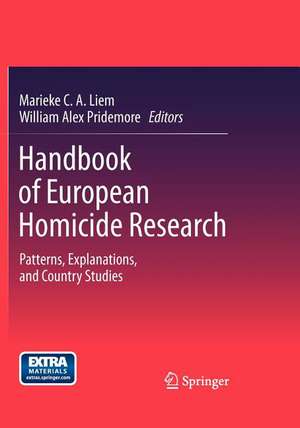Handbook of European Homicide Research: Patterns, Explanations, and Country Studies
Editat de Marieke C. A. Liem, William Alex Pridemoreen Limba Engleză Paperback – 17 sep 2012
This work will be both conceptual and practical. conceptual and practical. Conceptual aspects will focus on theoretical frameworks and patterns and trends of violence in Europe. Practical aspects will examine the results of empirical research, topics relating to different data sources and the variation of legal definitions of violence throughout Europe, and policy issues relating to variation in homicide prevention and punishment of homicide offenders throughout Europe.
This handbook will not only provide an up-to-date reference that brings together known information, but will also offer previously unpublished comprehensive literature reviews and original research findings. The editors’ distinctive approach is to provide readers with an English-language central source of information about the voluminous literature on European homicide research that is currently spread widely in dozens of different European and American journals.
| Toate formatele și edițiile | Preț | Express |
|---|---|---|
| Paperback (1) | 1233.83 lei 43-57 zile | |
| Springer – 17 sep 2012 | 1233.83 lei 43-57 zile | |
| Hardback (1) | 1240.93 lei 43-57 zile | |
| Springer – 14 oct 2011 | 1240.93 lei 43-57 zile |
Preț: 1233.83 lei
Preț vechi: 1504.67 lei
-18% Nou
Puncte Express: 1851
Preț estimativ în valută:
236.12€ • 245.11$ • 196.89£
236.12€ • 245.11$ • 196.89£
Carte tipărită la comandă
Livrare economică 24 martie-07 aprilie
Preluare comenzi: 021 569.72.76
Specificații
ISBN-13: 9781461458661
ISBN-10: 1461458668
Pagini: 528
Ilustrații: XI, 513 p. 87 illus.
Dimensiuni: 178 x 254 x 28 mm
Greutate: 0.91 kg
Ediția:2012
Editura: Springer
Colecția Springer
Locul publicării:New York, NY, United States
ISBN-10: 1461458668
Pagini: 528
Ilustrații: XI, 513 p. 87 illus.
Dimensiuni: 178 x 254 x 28 mm
Greutate: 0.91 kg
Ediția:2012
Editura: Springer
Colecția Springer
Locul publicării:New York, NY, United States
Public țintă
ResearchCuprins
Introduction.-Section One.-Homicide data in Europe: Definitions, sources and statistics.-Long-term historical trends of homicide in Europe.-Contemporary differences in rates and trends of homicide among European nations.-Regional variation in Europe between homicide and other forms of external death and criminal offences.-Theory and explanation in contemporary European homicide research.- A review of the cross-national empirical literature on social structure and homicide.- Explaining variation in homicide rates across Eastern and Western European cities: The effects of social, political and economic forces.- The effects of political, economic, and social changes on homicide in Eastern Europe.- Family Violence in Europe: Child homicide and intimate partner violence.-Rural homicide in Europe.-Homicide followed by suicide in Europe.-Terrorism in Europe from 1945-present.-Alcohol and homicide in Europe.-Immigration and homicide in contemporary Europe.-Firearms and homicide in Europe.-Homicide and punishment in Europe.- Section Two.-Homicide in England & Wales.-Homicide in France.- Homicide in Germany.-Homicide in the Netherlands.- Homicide in Switzerland.- Homicide in Spain.-Homicide in Italy.-Homicide in Finland.- Homicide in Sweden.- Homicide in Estonia.-Homicide in Lithuania.-Homicide in Russia, Ukraine & Belarus.
Recenzii
From the reviews:
“Editors … view the ongoing unification of Europe as an opportunity to consolidate knowledge from prior studies while offering entirely new research specifically commissioned from academics and professionals in various disciplines. The handbook’s arrangement in two sections reflects this approach. … This is a highly useful cross-cultural handbook. Summing Up: Recommended. Graduate students and above in criminology and related disciplines.” (D. K. Frasier, Choice, Vol. 50 (7), March, 2013)
“Editors … view the ongoing unification of Europe as an opportunity to consolidate knowledge from prior studies while offering entirely new research specifically commissioned from academics and professionals in various disciplines. The handbook’s arrangement in two sections reflects this approach. … This is a highly useful cross-cultural handbook. Summing Up: Recommended. Graduate students and above in criminology and related disciplines.” (D. K. Frasier, Choice, Vol. 50 (7), March, 2013)
Notă biografică
Dr. Pridemore is Professor and Director of Graduate Studies in the Department of Criminal Justice at Indiana University, where he is also Associate Director of the Consortium for Education and Social Science Research, Adjunct Professor of Sociology, and an affiliate faculty member of the Russian and East European Institute. He received his PhD from SUNY-Albany in 2000. He is a member of the National Consortium on Violence Research and spent a year as a Research Fellow at Harvard University in the Davis Center for Russian and Eurasian Studies. His main criminological research interests include social structure and homicide, alcohol and violence, the impact of democratization and marketization on homicide rates in Russia, and the measurement of crime and deviance. He also carries out research on alcohol epidemiology, the Russian mortality crisis, and social structure and suicide.
Dr. Pridemore's research has been funded by the National Institutes of Health/National Institute on Alcohol Abuse and Alcoholism, the National Council for Eurasian and East European Research, the National Institute of Justice, and the American Sociological Association/National Science Foundation. His research is interdisciplinary and has been published in leading journals in several disciplines, including criminology (Criminology, Journal of Quantitative Criminology, Journal of Research in Crime and Delinquency, Justice Quarterly), public health and epidemiology (American Journal of Public Health, Addiction, Journal of Epidemiology and Community Health, European Journal of Public Health), and sociology (Social Forces, Social Science and Medicine, European Sociological Review). He also recently edited a volume on law, crime, and justice in transitional Russia, which was published by Rowman & Littlefield.
Marieke Liem is Assistant Professor of Criminology at Leiden University, the Netherlands. She graduated from Cambridge University and received her PhD from Utrecht University, the Netherlands. She has conducted research in several European and non-European countries and has been a visiting scholar at Northeastern University College of Criminal Justice and as a research affiliate at the Violent Injury Prevention Center, Harvard School of Public Health. She is currently chairing the European Homicide Research Group. She has been the recipient of several research grants. Her research interests involve domestic homicide, homicide by the mentally ill, homicide-suicide and international comparative research in lethal violence. Other research interests include the relationship between homicide, suicide and media reporting on these acts.
She has published in scientific national and international journals in various fields, including homicide research (Homicide Studies), forensic psychology (Journal of Forensic Psychiatry and Psychology, Criminal Behavior and Mental Health, Schizophrenia Bulletin, Aggression and Violent Behavior), criminology (Tijdschrift voor Criminologie, Aggressive Behavior, International Journal of Offender Therapy and Comparative Criminology), sociology (Tijdschrift voor Veiligheid) and public health (Child Abuse and Neglect, Suicide and Life-Threatening Behavior).
Marieke Liem is Assistant Professor of Criminology at Leiden University, the Netherlands. She graduated from Cambridge University and received her PhD from Utrecht University, the Netherlands. She has conducted research in several European and non-European countries and has been a visiting scholar at Northeastern University College of Criminal Justice and as a research affiliate at the Violent Injury Prevention Center, Harvard School of Public Health. She is currently chairing the European Homicide Research Group. She has been the recipient of several research grants. Her research interests involve domestic homicide, homicide by the mentally ill, homicide-suicide and international comparative research in lethal violence. Other research interests include the relationship between homicide, suicide and media reporting on these acts.
She has published in scientific national and international journals in various fields, including homicide research (Homicide Studies), forensic psychology (Journal of Forensic Psychiatry and Psychology, Criminal Behavior and Mental Health, Schizophrenia Bulletin, Aggression and Violent Behavior), criminology (Tijdschrift voor Criminologie, Aggressive Behavior, International Journal of Offender Therapy and Comparative Criminology), sociology (Tijdschrift voor Veiligheid) and public health (Child Abuse and Neglect, Suicide and Life-Threatening Behavior).
Dr. Pridemore's research has been funded by the National Institutes of Health/National Institute on Alcohol Abuse and Alcoholism, the National Council for Eurasian and East European Research, the National Institute of Justice, and the American Sociological Association/National Science Foundation. His research is interdisciplinary and has been published in leading journals in several disciplines, including criminology (Criminology, Journal of Quantitative Criminology, Journal of Research in Crime and Delinquency, Justice Quarterly), public health and epidemiology (American Journal of Public Health, Addiction, Journal of Epidemiology and Community Health, European Journal of Public Health), and sociology (Social Forces, Social Science and Medicine, European Sociological Review). He also recently edited a volume on law, crime, and justice in transitional Russia, which was published by Rowman & Littlefield.
Marieke Liem is Assistant Professor of Criminology at Leiden University, the Netherlands. She graduated from Cambridge University and received her PhD from Utrecht University, the Netherlands. She has conducted research in several European and non-European countries and has been a visiting scholar at Northeastern University College of Criminal Justice and as a research affiliate at the Violent Injury Prevention Center, Harvard School of Public Health. She is currently chairing the European Homicide Research Group. She has been the recipient of several research grants. Her research interests involve domestic homicide, homicide by the mentally ill, homicide-suicide and international comparative research in lethal violence. Other research interests include the relationship between homicide, suicide and media reporting on these acts.
She has published in scientific national and international journals in various fields, including homicide research (Homicide Studies), forensic psychology (Journal of Forensic Psychiatry and Psychology, Criminal Behavior and Mental Health, Schizophrenia Bulletin, Aggression and Violent Behavior), criminology (Tijdschrift voor Criminologie, Aggressive Behavior, International Journal of Offender Therapy and Comparative Criminology), sociology (Tijdschrift voor Veiligheid) and public health (Child Abuse and Neglect, Suicide and Life-Threatening Behavior).
Marieke Liem is Assistant Professor of Criminology at Leiden University, the Netherlands. She graduated from Cambridge University and received her PhD from Utrecht University, the Netherlands. She has conducted research in several European and non-European countries and has been a visiting scholar at Northeastern University College of Criminal Justice and as a research affiliate at the Violent Injury Prevention Center, Harvard School of Public Health. She is currently chairing the European Homicide Research Group. She has been the recipient of several research grants. Her research interests involve domestic homicide, homicide by the mentally ill, homicide-suicide and international comparative research in lethal violence. Other research interests include the relationship between homicide, suicide and media reporting on these acts.
She has published in scientific national and international journals in various fields, including homicide research (Homicide Studies), forensic psychology (Journal of Forensic Psychiatry and Psychology, Criminal Behavior and Mental Health, Schizophrenia Bulletin, Aggression and Violent Behavior), criminology (Tijdschrift voor Criminologie, Aggressive Behavior, International Journal of Offender Therapy and Comparative Criminology), sociology (Tijdschrift voor Veiligheid) and public health (Child Abuse and Neglect, Suicide and Life-Threatening Behavior).
Textul de pe ultima copertă
This comprehensive work provides a reference for the substantive, methodological, and policy-oriented aspects of homicide research in Europe. Part one of this work covers the most recent substantive and methodological information about European homicide research. The second part will contains detailed case studies on homicide research in 15-20 individual European nations.
This work will be both conceptual and practical. conceptual and practical. Conceptual aspects will focus on theoretical frameworks and patterns and trends of violence in Europe. Practical aspects will examine the results of empirical research, topics relating to different data sources and the variation of legal definitions of violence throughout Europe, and policy issues relating to variation in homicide prevention and punishment of homicide offenders throughout Europe.
This handbook will not only provide an up-to-date reference that brings together known information, but will also offer previously unpublished comprehensive literature reviews and original research findings. The editors’ distinctive approach is to provide readers with an English-language central source of information about the voluminous literature on European homicide research that is currently spread widely in dozens of different European and American journals.
This work will be both conceptual and practical. conceptual and practical. Conceptual aspects will focus on theoretical frameworks and patterns and trends of violence in Europe. Practical aspects will examine the results of empirical research, topics relating to different data sources and the variation of legal definitions of violence throughout Europe, and policy issues relating to variation in homicide prevention and punishment of homicide offenders throughout Europe.
This handbook will not only provide an up-to-date reference that brings together known information, but will also offer previously unpublished comprehensive literature reviews and original research findings. The editors’ distinctive approach is to provide readers with an English-language central source of information about the voluminous literature on European homicide research that is currently spread widely in dozens of different European and American journals.
Caracteristici
Authoritative Handbook on current and historical homicide research throughout Europe, from key experts in the field
Includes country-specific studies on homicide patterns, policies, and punishments
Comprehensive guide to the relevant theory, recent research, policy developments, and current debates
Includes supplementary material: sn.pub/extras
Includes country-specific studies on homicide patterns, policies, and punishments
Comprehensive guide to the relevant theory, recent research, policy developments, and current debates
Includes supplementary material: sn.pub/extras











